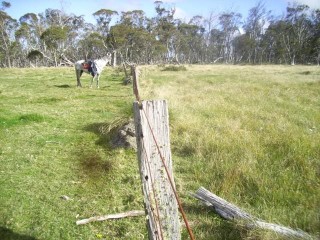 The Federal Government has overruled the Victorian Government’s bid to reintroduce cattle grazing in the Alpine National Park in Victoria, saying the move is “clearly unacceptable” under national environmental law and will not proceed.
The Federal Government has overruled the Victorian Government’s bid to reintroduce cattle grazing in the Alpine National Park in Victoria, saying the move is “clearly unacceptable” under national environmental law and will not proceed.
The Victorian Government has planned to re-introduce up to 400 cattle to graze in the State’s Alpine National Park for five months a year for five years, in a research trial to test whether grazing can help to reduce fuel loads and minimise bushfire risks in the park estate.
In December, the Victorian Department of Sustainability and Environment submitted a proposal to the Federal Government for assessment under the Environment Protection and Biodiversity Conservation (EPBC) Act 1999.
In a statement issued today, environment minister Tony Burke said after careful consideration he had accepted the advice of the Environment Department that the proposal to reintroduce cattle to the Alpine National Park would have a clearly unacceptable impact on the national heritage values of the Australian Alps National Parks and Reserves National Heritage Place.
Nine out of the 10 sites selected by the Victorian Government were partly or entirely located within the Australian Alps National Parks and Reserves, which was included on the National Heritage List in 2008. The area contained a number of important ecological environments, Mr Burke said.
Last year, the Federal Government made regulatory changes that formally recognised the significant impact of livestock grazing on the Australian Alps National Parks and Reserves National Heritage place under the EPBC Act.
The regulation specifies that grazing of domestic stock including cattle could have a significant impact on the heritage values of the Australian Alps Heritage Area and that any future new grazing activities proposed in the Australian Alps Heritage Area, including the Alpine National Park, need to be assessed under the EPBC Act.
"My decision is based on a thorough and rigorous assessment of the proposal, taking into account the advice of my department," Mr Burke said.
"I have accepted the advice of my department that the proposed action of reintroducing up to 400 cattle would have a clearly unacceptable impact on the listed national heritage values of the Australian Alps National Parks and Reserves National Heritage Place.
"The assessment has shown there is irrefutable evidence that cattle grazing would damage the sensitive natural environment, disturb the remote and wild character of the area, detract from aesthetic values, and erode its heritage values.
"While my personal views on this matter are known, in determining this decision I have considered only whether or not the proposed action would be in breach of the EPBC Act."
REACTION
The Mountain Cattlemen’s Association of Victoria has vowed to fight the ruling.
MCAV president Mark Coleman said Tony Burke’s decision was predictable.
“Given Mr Burke’s constant barrage against the trials, of course he would seek legal advice that reflected his personal views.” Mr Coleman said.
He said very same heritage values that mountain cattlemen had helped to create since 1833 were now being used to exclude them.
“Mr Burke is cherry picking ‘heritage’ to suit his politics and the need to pacify the Greens in Canberra,” Mr Coleman said.
“In the process he is attempting to destroy the important heritage of the Mountain Cattlemen identified in the same Legislation he is hiding behind.
“He is also cutting across Victoria’s rights to manage its own land. ”
Mr Coleman said suggestions by Mr Burke that a committee be established to discuss feral pests and weeds in Australia’s national parks was a waste of money designed to ‘set up a smoke screen of pretence’.
He said human intervention had played a critical role in managing the impact of people and feral pests in national parks , and it followed that human intervention was required to combat issues like fuel loads.
“ Grazing is a viable way to reduce fuel and the Victorian Government should be allowed to investigate the value of all management ideas for its land, including grazing.
“Not once has Mr Burke addressed the vexed question of how Victoria manages fire and fuel loads, which demonstrates he isn’t interested in the real issues facing Victoria, only Federal politics.
“The Mountain Cattlemen have accumulated more than 170 years of intergenerational experience about the management of the High Country. Mr Burke spent one hour at one grazing site last year and then claimed he knew the lot.”
The Victorian Farmers Federation has also expressed anger at Mr Burke’s decision, saying the federal environment minister should “butt out” and allow the Ballieu Government to fulfil its election commitment to allow the continuation of cattle grazing in Victoria’s alpine areas.
VFF Livestock group president Chris Nixon said that the Federal Government was interfering in the issue to suit its own political agenda.
“Land management has always been a state issue. Banning alpine grazing is a way for Tony Burke and the Federal Government to implement a green agenda to suit their own political needs,” Mr Nixon said.
“The Federal Government has shown its intent and again has been using the Environment Protection and Biodiversity Conservation Act as a means to take control of state land management issues.
“The Victorian Government has the full support of the VFF to pursue all avenues to allow high country cattlemen to continue grazing stock in Victoria’s high country.”
Mr Burke said the Alpine National Park formed part of the Australian Alps National Parks and Reserves national heritage place that was listed on the National Heritage List to identify and protect the wide range of nationally significant natural and cultural values found within it. The parks and reserves extend over the Victorian, New South Wales and Australian Capital Territory borders and in total cover over 1.6 million hectares.
